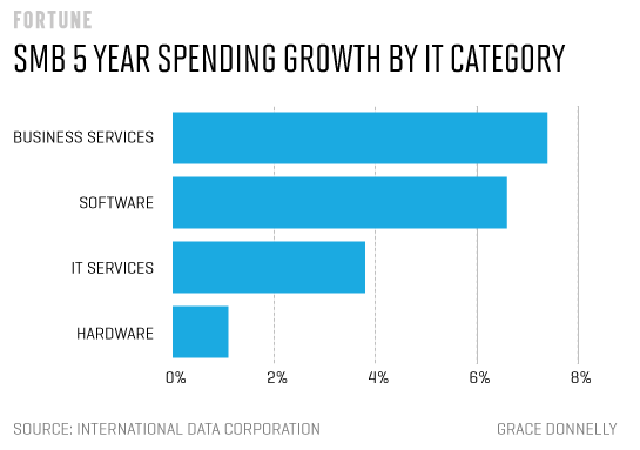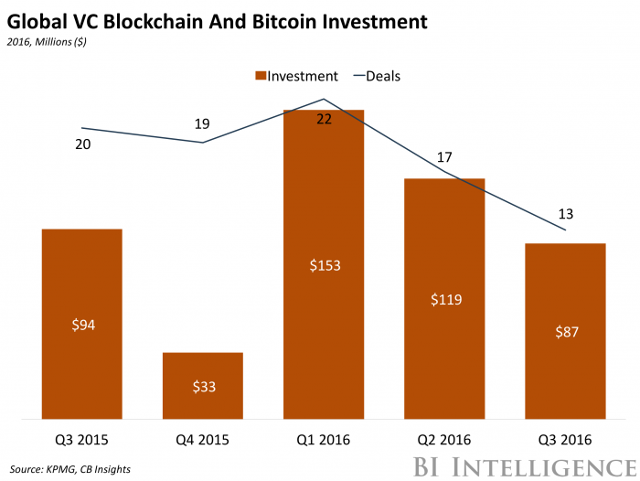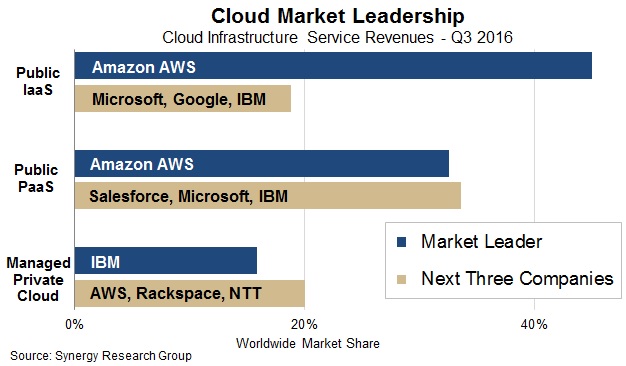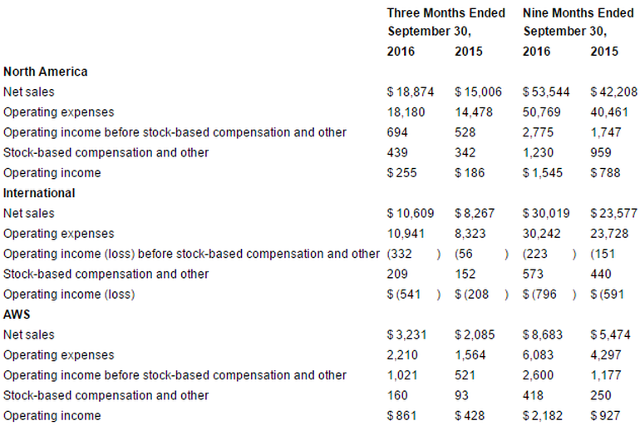Supplier Report: 12/3/2016

Amazon is all over the news this week as they are introducing more AI/machine learning tools, more industry specific platforms, and more flexible GPU pricing.
Last week there were rumors that IBM was having issues with their cloud hosting financials, but they bounced back this week by securing American Airlines as a Bluemix customer and also bringing more focus on their blockchain solutions.
HPE is… just confusing me with every public action and comment they make.
Acquisitions
- SUSE Acquires HPE OpenStack Cloud Technology and Talent
Linux vendor SUSE is acquiring OpenStack cloud and Cloud Foundry Platform-as-a-Service (PaaS) technology and staff from Hewlett Packard Enterprise (HPE) in a deal announced on November 30. Financial terms of the acquisition are not being publicly disclosed and the deal is set to close in the first quarter of 2017.
http://www.eweek.com/cloud/suse-acquires-hpe-openstack-cloud-technology-and-talent.html
- IBM closes acquisition of financial consulting firm Promontory (old news)
The firm’s statement continues, “The acquisition complements IBM’s Industry Platforms business, formed to develop open vertical platforms – the first comprehensive ‘as a service’ offerings designed from the ground up for individual industries. These platforms will integrate IBM Cloud, Watson and capabilities from across digital ecosystems of specialized providers, and serve multiple clients in an industry – delivering dramatically reduced costs for outcomes spanning speed, quality, audit-ability, security and transparency.”
http://www.consultancy.uk/news/12849/ibm-closes-acquisition-of-financial-consulting-firm-promontory
- Twitter buys startup Yes, Inc. and scores a new VP of product in the process
The new VP of Product, Keith Coleman, steps into the role as part of Twitter’s purchase of seven-person mobile app startup Yes, Inc., where he served as CEO. Prior to that gig, the exec worked as a product manager for another little startup called Google.
- Fitbit is buying troubled smartwatch maker Pebble for around $40 million
A source close to the company told TechCrunch that watch maker Citizen was interested in purchasing Pebble for $740 million in 2015. This deal failed and before the launch of the Pebble 2 Intel made an offer for $70 million. The CEO, Eric Migicovsky refused both offers. Our source said that Fitbit is now paying between $34 and $40 million for the company and is “barely covering their debts.”
https://techcrunch.com/2016/11/30/fitbit-pebble/?ncid=rss
I am putting this news item on the report as now there is one less IoT/wearable company that could be making health related devices
Related News:
Smartwatches wear out their welcome with MotorolaAndroid Wear has had a rough year. What started with a promising announcement of Android Wear 2.0 at Google I/O has ended with a delayed launch, an utter lack of new models and now, a disillusioned manufacturer. In an interview with the Verge, Shakil Barkat, Motorola’s head of global product development, said in no uncertain terms that the company has soured on smartwatches and doesn’t “see enough pull in the market” to release a new model anytime soon.
- Can CSC spin-merger help HPE strike the infrastructure-services balance?
“With ES moving out, it gives us the opportunity to partner far more with the likes of [professional services company] Accenture,” he said.
Also:
HPE VP Alistair Winner says this:When asked if HPE is still primarily a product and hardware company, Alastair answered resolutely, “No.”
He said where once customers just wanted to buy gear from them and move on, “now customers are saying, ‘Actually, I don’t want to buy gear anymore. Help me consume it, whether that’s on premise or on the cloud.’”
This is a total copout BS statement and Alistair needs to be called out on that.
Artificial Intelligence
- AWS comes out swinging with A.I. services
The three services being rolled out are Amazon Rekognition for image recognition; Amazon Polly for text-to-speech services; and Amazon Lex, the technology inside its smart device Alexa, offering speech recognition services.
- Should Microsoft be your AI and machine learning platform?
The cloud-based machine-learning marketplace is increasingly crowded, with competing services from the likes of Google, IBM and Hewlett Packard Enterprise. Mike Gualtieri, VP at analyst house Forrester, said that while Microsoft offered simpler tools for firms building their own machine-learning models, the quality of the firm’s on-demand, pre-trained speech, vision and language recognition services would likely be less effective than Google’s because of the search giant’s access to huge amounts of training data.
http://www.zdnet.com/article/should-microsoft-be-your-ai-and-machine-learning-platform/
- Pfizer to use IBM Watson to devise immunotherapies for cancer
“With the incredible volume of data and literature available in this complex field, we believe that tapping into advanced technologies can help our scientific experts more rapidly identify novel combinations of immune-modulating agents,” said Mikael Dolsten, Pfizer’s president of worldwide research and development. “We are hopeful that by leveraging Watson’s cognitive capabilities in our drug discovery efforts, we will be able to bring promising new immuno-oncology therapeutics to patients more quickly.”
http://www.modernhealthcare.com/article/20161201/NEWS/161209996
Cloud
- How Amazon Web Services is luring banks to the cloud
Jassy said the trend started at last year’s re:Invent, where Capital One Financial Chief Information Officer Rob Alexander talked publicly about recreating the consumer banking experience in the cloud. On Tuesday, Amazon said that over the next five years, Capital One will migrate “many core business and customer applications to AWS.”
Intuit, whose tax and payroll software exposes it to strict regulations, has moved completely to Amazon’s cloud. And the Financial Industry Regulatory Authority, or FINRA, is headed in that direction.
http://www.cnbc.com/2016/11/30/how-amazon-web-services-is-luring-banks-to-the-cloud.html
- How to compare cloud costs between Amazon, Microsoft and Google
One advantage of IaaS is that customers can spin resources up and down as needed. But the most expensive way to buy cloud-based virtual machines is to pay for them on-demand. If customers plan and commit to a long-term contract, they will save money.
In AWS, the primary way to do this is by using Reserved Instances (RIs). “You get the discount in exchange for making a one-year or three-year commitment with the longer commitment giving a higher discount,” RightScale engineers explain. “If you also pay for some or all of that committed usage upfront, the discount gets larger.” RightScale says discounts of RIs compared to on-demand VMs range from 24% to 75%.
- American Airlines selects IBM as its Cloud provider
As part of the partnership, American Airlines will move select enterprise applications to IBM’s Cloud. The airline will be able to leverage the global footprint of IBM Cloud, which consists of more than 50 data centers spanning 17 countries, as well as a wide range of application development capabilities through IBM Bluemix. In addition the company will have access to IBM advanced analytics capabilities and technologies, all of which will enable the company to advance its enterprise into a cognitive infrastructure that offers greater resiliency and better customer experiences.
https://www.traveldailynews.com/post/american-airlines-selects-ibm-as-its-cloud-provider
- Amazon Web Services is rolling out a way to use to use just the GPU power you need
That means companies can tap into just a sliver of GPU power, or a larger amount, on demand as they need it and pay for that amount. GPUs can run a ton of tasks in parallel and have a lot of advantages in certain compute situations, like rendering games. But some lightweight processes don’t necessary require a full GPU cluster, which running for a company — especially a smaller one — might become prohibitively expensive very quickly. The new product, introduced at AWS Re:Invent, is called Elastic GPU for EC2.
- Docker for AWS: Who’s it really for?
The biggest clue as to who Docker for AWS is aimed at: its use of CloudFormation as its interface to AWS. Cloud Formation was created to allow AWS services to be stood up as a single unit, without the user needing intimate knowledge of how to configure each piece. Configuring services like Elastic Load Balancing or CloudWatch isn’t a trivial process, and most AWS components have a learning curve associated with them.
Docker for AWS reduces the overall learning curve for those who want to use Docker—and Docker Swarm—on AWS. But users can also manually configure a setup later on if the need arises.
Datacenter
- Here’s More Bad News for Tech Hardware Makers
Spending by small and medium businesses (SMBs) on laptops, PCs, peripherals, and other hardware will show a just a 1.1% compound annual growth rate (CAGR) over the next four years compared to 6.6% growth in software spending, and 3.8% growth in IT services spending, according to IDC.
http://fortune.com/2016/11/28/tech-hardware/

Note: This article is a bit of a mess. Cloud is not called out specifically but is probably included in business services, which includes outsourcing. - Hewlett Packard Enterprise Demonstrates World’s First Memory-Driven Computing Architecture
“We have achieved a major milestone with The Machine research project — one of the largest and most complex research projects in our company’s history,” said Antonio Neri, Executive Vice President and General Manager of the Enterprise Group at HPE. “With this prototype, we have demonstrated the potential of Memory-Driven Computing and also opened the door to immediate innovation. Our customers and the industry as a whole can expect to benefit from these advancements as we continue our pursuit of game-changing technologies.”
Software/SaaS
- IBM is continuing its blockchain push
Putting blockchain to use for real-world transactions is likely not that far off. If working groups’ tests are successful, firms could be using it to transact real value as early as the end of this year and we could see widespread industry application within the next few years.
http://www.businessinsider.com/ibm-is-continuing-its-blockchain-push-2016-12

Other
- Why Have IBM’s Global Business Services Failed to Grow?
The government remained tight-lipped about the specifics of what was discussed, but did say that among the topics of discussion was the IT skills gap and the Digital Single Market – an initiative to ensure people and businesses across the continent can access digital services seamlessly and are subject to the same rules and regulations.
http://marketrealist.com/2016/11/ibms-global-business-services-failed-grow-2/
Photo: vedanti
SourceCast: Episode 48: Making Green Clouds
Supplier Report: 11/5/2016

Cloud providers are growing fast, but nobody is growing faster than Amazon. Such growth requires power, and Amazon is following in Google’s footsteps in trying to convert to all renewable energy.
Google combined their renewable energy goals with their AI systems to gain efficiencies, and the whole situation is reminding me of the not-so-great Johnny Depp movie Transcendence (the AI creates an awesome solar farm so it can’t be cut off).
While Amazon figures out their power needs, Microsoft is trying to take down the communication hub site Slack with their new Teams offering. Dell is also improving their document management applications… right before they sell them off to OpenText?
Acquisitions
- CenturyLink to Buy Level 3 Communications for $25 Billion
Level 3 runs one of the largest internet backbones in the world but has turned its focus to small and midsize business customers to reverse slowing sales growth in its core operations. CenturyLink, traditionally a rural phone company, has sought to upgrade its network with fiber-optic lines in a bid to compete with AT&T Inc.,Verizon Communications Inc. and rivals in the cable industry.
http://www.wsj.com/articles/centurylink-to-buy-level-3-communications-for-25-billion-1477911639
- IBM buys Expert Personal Shopper from Fluid to build out Watson’s conversation skills
IBM has made another acquisition to beef up Watson, a week after it announced a raft of new features and milestones for its artificial intelligence effort: it has acquired a business called Expert Personal Shopper (XPS), a platform, and bot, that holds conversations with people online to help figure out what they need to buy, and to help them buy it. XPS had originally been built by Fluid, a strategic partner (and investment) of IBM’s, to run on Watson.
- Jim Cramer — Tableau Not a Target for Salesforce
Shares are now down more than 11% Wednesday. The M&A catalyst has been removed, and while Tableau beat on earnings-per-share estimates, its sales results missed expectations. Simply put, the company didn’t close enough deals during the quarter to make the results compelling. It was a letdown, Cramer concluded.
Furthermore, Tableau is not a potential acquisition target for Salesforce at this time, Cramer added.
https://www.thestreet.com/story/13877565/1/jim-cramer-tableau-not-a-target-for-salesforce.html
Artificial Intelligence
- Detecting pre-symptom cancer at the nanoscale
- IBM Introduces New Watson Solution for Supply Chain Professions
Part of IBM’s new cognitive solutions for supply chain professionals, IBM Watson Supply Chain Insights, continuously learns about a company’s normal supply chain patterns by analyzing and spotting trends in the data from multiple systems including trade partners, which can account for up to 65 percent of the value of a company derives from its products and services. The solution then alerts practitioners to potential disruptions, provides insights into estimated time delays and financial costs of the issue and recommends specific experts who can gather in a virtual workroom to quickly solve the problem.
http://www.arcweb.com/Blog/Post/1511/IBM-Introduces-New-Watson-Solution-for-Supply-Chain-Professions
- Why Peter Diamandis doesn’t fear AI
- There are currently 3 billion people online, but due to dropping bandwidth costs and private investors building satellite networks, low estimates project 6 billion people online by 2020.
- Peter talks about Moonshots: A moonshot, in a technology context, is an ambitious, exploratory and ground-breaking project undertaken without any expectation of near-term profitability or benefit and also, perhaps, without a full investigation of potential risks and benefits.
- Diamandis wants to increase the average human lifespan by 30 years. AI (Watson) is a huge part of that goal as it can analyse data from genome sequencing, advanced diagnostics, and providing medical care in remote areas without doctors.
- He wants to mine asteroids for resources (platinum) and fuel. His company is building rockets (Arkyd Spacecraft) to prospect asteroids. These ships will have AI (of course).
- Wants basic software to be able to teach children to read in the most remote areas with simple devices (there are current 1 billion illiterate people on the planet).
Cloud
- AWS Accounts for 45 Percent of Public IaaS Market Share: Synergy
Amazon Web Services (AWS) has a 45 percent share of the worldwide public cloud market, more than twice the size of the next three public IaaS providers combined, according to new data from Synergy Research Group.
http://talkincloud.com/iaas/aws-accounts-45-percent-public-iaas-market-share-synergy

- Amazon orders new wind farm in Ohio to help power cloud business
Amazon Web Services, as the tech giant’s cloud computing division is known, has vowed to fulfill at least half of the energy needs of its big data centers with renewable energy by 2017. That’s up from 40 percent in 2016, a goal that Amazon says it is on track to meet or exceed.
http://www.seattletimes.com/business/amazon/amazon-orders-new-wind-farm-in-ohio-to-help-power-cloud-business/
Trent Alert: Pay attention to power related issues for cloud providers. I have covered what Google is doing to manage their energy costs, but I see this becoming a much bigger DataCenter issue as these cloud blocks grow.
Amazon Adds their Fifth Renewable Energy Project in Ohio‘In November 2014, AWS shared its long-term commitment to achieve 100 percent renewable energy usage for the global AWS infrastructure footprint. Ambitious sustainability initiatives over the last 18-24 months have put AWS on track to exceed its 2016 goal of 40 percent renewable energy use and enabled AWS to set a new goal to be powered by 50 percent renewable energy by the end of 2017.’
http://crescentvale.com/2016/11/amazon-adds-fifth-renewable-energy-project-ohio/
- A peek inside Microsoft Azure’s open-source server and rack designs
“With this announcement you have one of the industry’s leading cloud providers sharing what they think the optimal cloud server design looks like,” says Ed Anderson, Research vice president, Cloud Services at Gartner. “Microsoft is deploying servers based on OCP in their cloud data centers, which provides a pretty good guide for hardware vendors to target that market.” Microsoft says about 90% of servers it buys for Azure data centers are based on OCP specifications.
- Is HPE ditching OpenStack? Company laying off a number of developers
The layoffs in the Stackato may indicate HPE is further retreating from the ultra-competitive cloud market amidst tough competition from AWS and Microsoft. Last year, HPE pulled the plug on its Helion hybrid cloud offering. In August, Bill Hilf, HPE’s current cloud leader, announced he was leaving the company to “pursue other opportunities.”
Datacenter/Desktop
- Microsoft Takes Apple by Surprise, Pours on the Heat
One of the things that may have assisted in this assessment was the Surface Dial (US$99) which, on the surface, has the instinctive technical feel of something from a science fiction future in contrast to Apple’s touch sensitive Touch Bar which is merely cool. (But see page 2 here for more.) Time will tell if Microsoft’s instincts prove superior or are simply a trade-off in concepts. In the meantime, Jason Snell at Six Colors looks at the relative merits of touching your work or touching the Touch Bar in “Perpendicular philosophy.”
https://www.macobserver.com/columns-opinions/microsoft-takes-apple-surprise-pours-heat/
- NetApp Plans Yet Another Round of Layoffs
The company said in regulatory filing on Thursday that it would lay off 6% of its workforce, or about 640 employees based on its total headcount of 10,700 workers.
Software/SaaS
- Dell EMC Sweetens ECD Products Before OpenText Acquisition
Today at Momentum — Dell EMC’s ECD user conference in Barcelona — the company unveiled long sought solutions around its three primary products: Documentum, InfoArchive and LEAP.
About a week after closing on its purchase of EMC, Dell signed a definitive agreement to sell ECD to OpenText. That acquisition is expected to close in early next year.
So all these new capabilities — many of which customers have been pleading to have for years — will benefit OpenText.
- Can Microsoft Teams out-Slack Slack?
Slack’s freemium model also puts these tools in the hands of small businesses, giving them a free taste with the option to pay for advanced features. The fact that Microsoft Teams is tied to Office 365 means it will struggle to win over some small operations, but its tight integration with the Office suite might tempt larger businesses to defect from services like Slack.
http://www.smh.com.au/technology/gadgets-on-the-go/can-microsoft-teams-outslack-slack-20161103-gshta3.html
Rapidly-growing startup goes after Microsoft in full-page New York Times ad
http://www.aol.com/article/finance/2016/11/03/s/21598333/ - Software licencing gets easier in the cloud? Not if your name is Microsoft
Features and functionality have been added to Plan 1 – including PowerApps that lets users create custom-made business apps – but if a customer doesn’t need them, then the price of their software has ramped massively, channel folk claimed. Depending on what employees were using, they may now pay more. Power users may actually pay less.
“There isn’t a direct one-for-one ratio, so Microsoft can wheedle out of it and tell customers they are getting more features. This is the challenge of explaining this to customers who want to know, ‘How do I get what I’m getting today and pay the same?'” a Microsoft supplier said.
Other
- Amazon posts disappointing Q3 results, but AWS continues to grow
Amazon Web Services earned $3.231 billion in revenue, up nearly 55 percent year-over-year. Its operating income came to $861 million — more than three times the operating income of Amazon’s North American e-commerce business, which came to $255 million. Meanwhile, its international business lost $541 million.
http://www.zdnet.com/article/amazon-posts-disappointing-q3-results-as-aws-continues-to-grow/

- IBM: From Firing To Hiring Spree
IBM has hired more than 100,000 new IBMers since January 2015, cloud advisors, digital representatives, data scientists, etc. This includes about 700 executives (not including acquisitions).
IBM’s hiring spree follows a massive shift of resources from traditional computing business to the emerging cognitive business. This includes what the company invested in in terms of CAPEX, R&D (which is up this year) and acquisitions (26 since the beginning of 2015). It also includes significant investments to amass the skills most valued by the market as the company pioneers new fields such as Cognitive and Cloud.
- Google reveals dangerous Windows 10 bug – and Microsoft is NOT happy about it
Google has incurred the wrath of fellow tech megacorp Microsoft by publicly flagging up a flaw in Windows and claiming hackers are exploiting it.
The search giant says it told Microsoft about the bug back on October 21, but as yet nothing has been done about it.The bug itself is found in the Windows kernal and can be used “as a security sandbox escape.”
Microsoft, in turn, has issued a statement to tech site Venturebeat , saying that Google is putting customers at risk.
http://www.mirror.co.uk/tech/google-reveals-dangerous-windows-10-9169924
Photo: Karsten Würth
Supplier Report: 10/29/2016

IBM had a big week due to their World of Watson conference. As one would imagine, an event called the World of Watson was heavily focused on AI and how it will integrate into our lives. They also used the event to announce the acquisition of another cloud-focused company. But IBM better watch out because Google’s Deepmind created an encryption protocol by itself.
There was also an OpenStack conference this week for cloud services. The event tested the ability to easily switch between 16 different cloud providers.
IBM announced it was much cheaper to support Macs over Window machines (which is actually old news), but Microsoft introduced some beautiful new desktops.
Acquisitions
- IBM To Acquire Sanovi Technologies For Hybrid Clouding
The announcement for the procurement event held on October 27, 2016, carried off with a deal which would help IBM to enhance its elasticity capabilities. It would further support to meet the complexities of the hybrid environment through advanced analytics. The following deal would help IBM to boost its Software Defined Resiliency strategy, delivering Business Continuity, along with providing Disaster Recovery services for its clients who are in the middle of hybrid and digital cloud transformation.
http://www.investopedia.com/stock-analysis/102816/ibm-buys-another-hybrid-cloud-specialist-ibm.aspx
Also:US software giant IBM on Thursday announced that it has signed a deal to acquire Bengaluru-based Sanovi Technologies for an undisclosed sum. The deal would enable IBM to bolster its Software Defined Resiliency strategy, delivery of Business Continuity and Disaster Recovery services for clients who are undergoing digital and hybrid cloud transformation.
http://www.ibtimes.co.in/ibm-buys-bengaluru-based-hybrid-cloud-firm-sanovi-technologies-701488
- AT&T’s Time Warner Deal Comes at a Huge Cost
AT&T’s deal values Time Warner at 22 times the cash it generated from its operations. That seems high. When Comcast bought NBCUniversal in 2013 it paid around 8 times operating cash flow. WhenVerizon bought AOL in 2015, a number of commentators suggested that it had paid through the roof for the former Internet whiz kid. But even in that deal, Verizon only paid about 9 times AOL’s adjusted operating income.
http://fortune.com/2016/10/24/att-time-warner-deal-share-price/
- Who Will Win This $9 Billion Game Of Chicken?
Who, if anyone, will blink? NetSuite’s weak quarter make it decreasingly likely that Oracle’s Larry Ellison will blink first. As for T. Rowe, they might not either. They opposed the Dell LBO and intended to vote against it (their shares were mistakenly voted for it, so perhaps they will tender to Oracle by accident). But with no available alternative to realize more value than the current deal, both NetSuite and T. Rowe holders will quickly regret it.
http://seekingalpha.com/article/4014664-will-win-9-billion-game-chicken
- Oracle CEO Hurd Says NetSuite Deal ‘Done from Our Perspective’
“Well it’s done from our perspective. We had special boards, special committees of both boards negotiate the transaction. We think we’ve made a fair offer of $109 a share,” he said.
Artificial Intelligence
- The World of Watson
Talking points from the 2 hour video:- Watson will be almost everywhere in 5 years. It will be in doctors offices and assist companies with M&A (it will have profiles on every company on the planet).
- John Kelly predicts that due to Watson’s modeling abilities, it will be able to predict future events in medical applications.
- Tom Friedman states that 2008 was a milestone year in technology, in part due to Watson and the advent of cloud technology (high speed internet, cheaper storage) and we missed it for what it really is and society has been stuck not taking advantage of it.
- Due to this technology, human interaction and sharing ideas has never been higher and the potential for quicker social change is more possible.
- Friedman goes down an interesting path of how people (not nations) have the ability to destroy and also repair everything (you just have to watch it).
- The video then shifts to new speakers doing their best Steve Jobs impressions talking about managing data via AI (nothing we haven’t discussed here already).
- IBM, Teva to Use A.I. for Drug Repurposing Program
First, the companies formed a three-year research collaboration aimed at using human input, real-world data, and machine learning algorithms to support drug repurposing efforts, wrote FierceBiotech.
Watson will sift through all of this information to try and find relationships between drug molecules and certain diseases. A successful initiative like this could install an efficient, cost-effective process that the entire pharmaceutical industry can adopt to help bring new therapies to market.
https://www.rdmag.com/article/2016/10/ibm-teva-use-ai-drug-repurposing-program
- Google’s AI created its own form of encryption
As the New Scientist reports, Abadi and Andersen assigned each AI a task: Alice had to send a secret message that only Bob could read, while Eve would try to figure out how to eavesdrop and decode the message herself. The experiment started with a plain-text message that Alice converted into unreadable gibberish, which Bob could decode using cipher key. At first, Alice and Bob were apparently bad at hiding their secrets, but over the course of 15,000 attempts Alice worked out her own encryption strategy and Bob simultaneously figured out how to decrypt it. The message was only 16 bits long, with each bit being a 1 or a 0, so the fact that Eve was only able to guess half of the bits in the message means she was basically just flipping a coin or guessing at random.
https://www.engadget.com/2016/10/28/google-ai-created-its-own-form-of-encryption/
Cloud
- ‘Unprecedented’ cyberattack involved tens of millions of IP addresses
The attackers took advantage of traffic-routing services such as those offered by Alphabet Inc’s Google and Cisco Systems Inc’s OpenDNS to make it hard for Dyn to root out bad traffic without also interfering with legitimate inquiries, Drew said.
But hundreds of thousands, and maybe millions, of those security cameras and other devices have been infected with a fairly simple program that guessed at their factory-set passwords – often “admin” or “12345” or even, yes, “password” – and, once inside, turned them into an army of simple robots. The company also has offices in England and Singapore, and field operations across several USA cities, including San Francisco and Seattle.
http://crcconnection.com/2016/10/24/unprecedented-cyberattack-involved-tens-of-millions-of-ip.html
- Switching clouds: What Spotify learned when it swapped AWS for Google’s cloud
“Now that we’ve done the move, we are generally really happy but we have some wishes for the future.
We would love to see cross-continental replication, like the fact we now run in a US Central regional bucket, that causes a slight latency for our European users.
We ideally would like to have another bucket in Asia. At the moment, the GCS does not allow cross-continental replication.
We’re also seeing slightly lower cold read latencies than with S3, the good news is that Google has improvements upcoming and we’ve worked with them to shear off 30ms.”
- IBM’s cloud move: New unified platform buries SoftLayer under Bluemix brand
As part of that shift, IBM today also announced its unified cloud platform, allowing customers to manage all Bluemix and SoftLayer assets from a single console using an IBM ID.
IBM isn’t planning on changing the substance of SoftLayer’s systems, products, services, and support, but it will phase the name out as it moves everything, including the SoftLayer blog over to Bluemix domains.
http://www.zdnet.com/article/ibms-cloud-move-new-unified-platform-buries-softlayer-under-bluemix-brand/
Smart. Every time I mention SoftLayer, people ask “what is that?” - You can run the same programs on 16 different OpenStack clouds
Sixteen different vendors did a live demo at OpenStack Summit showing that you could run the same software stack on 16 separate OpenStack platforms.
Here’s the amazing part. All 16 vendors had the program running on their platforms in under 10 minutes. Try moving your application from say Amazon Web Services (AWS) to Microsoft Azure that easily.
Don Rippert, IBM’s general manager of cloud strategy, explained, “Yes all 16 companies will compete, but interoperability is a rising tide. It makes things better for all of us.” Jonathan Bryce, the OpenStack Foundation’s executive director, added “SUSE, Canonical, Red Hat, you all hate each other right? But, the program works on all your systems.”
http://www.zdnet.com/article/you-can-run-the-same-programs-on-16-different-openstack-clouds/
Datacenter/Desktop
- NetApp boss not deterred by Dell EMC
When asked whether Dell EMC’s extended reach in the industry would hurt NetApp’s business, Kurian took the stance that bigger wasn’t always better.
“Very simply, we’re taking share from EMC today. We’re the fastest growing SAN vendor in the market. We’re the fastest growing all-flash array vendor in the market. And despite their reach, we have better solutions,” he said.
http://www.crn.com.au/news/netapp-boss-not-deterred-by-dell-emc-440089
- The New Microsoft Surface Studio
Software/SaaS
- Slack Announces Partnership With IBM
Watson will be available to Slack’s developers and enterprise users, will work to develop new communication tools, and will be incorporated into Slack’s Slackbot; the customer relations account for the service.
“Making Watson’s capabilities and Slack’s capabilities available to third-party developers to make those more intelligent,” Slack CEO Stewart Butterfield said about the partnership during Wednesday afternoon’s “Power Lunch” on CNBC.
https://www.thestreet.com/story/13868522/1/slack-announces-partnership-with-ibm.html
Other
- IBM official says Macs much cheaper to own than Windows PCs
Previn also said that while a Mac initially cost from US$117 to US$454 more than a Windows PC that had similar specs, IBM was able to save between US$273 and US$543 over four years per Mac compared to a similarly configured Windows PC.
When one added up all the software that one had to buy from Microsoft to run and manage IBM’s Windows devices, Windows PCs were thrice as expensive as Macs, he said.
“It ends up being US$57.3 million more expensive per 100,000 Windows machines, or exactly three times the cost,” he said. “And this is a conservative number. This represents the best pricing we’ve ever gotten from Microsoft.”
- Microsoft hikes prices for British businesses in wake of Brexit vote
The tech giant announced in a blog post that it would be raising fees for its UK business clients in order to “realign close to euro levels,” and harmonise prices across the EU.
“We periodically assess the impact of local pricing of our products and services to ensure there is reasonable alignment across the region and this change is an outcome of this assessment,” Microsoft said.
While enterprise software prices will increase by 13%, cloud prices will jump by as much as 22% for clients paying in pounds.
http://www.mirror.co.uk/tech/microsoft-reveals-british-businesses-pay-9116171
- IBM board approves additional $3 billion stock buyback
The board today also authorized $3 billion in additional funds for use in the company’s stock repurchase program. IBM said it will repurchase shares on the open market or in private transactions from time to time, depending on market conditions.
- “Dirty COW”, the most dangerous Linux Bug for the last 9 years
Talking to Ars Technica, Senior Security Researcher at Azimuth Security, Dan Rosenberg states that this particular bug is so far the most serious of all bugs ever found in Linux systems. The fact that this bug has been there for the last 9 years makes the situation even more concerning.
“It’s probably the most serious Linux local privilege escalation ever. The nature of the vulnerability lends itself to extremely reliable exploitation. This vulnerability has been present for nine years, which is an extremely long period of time,” said Rosenberg.
- Google Jamboard:
Yeah, this product really doesn’t have a place on this post, but I really want one!
Photo: Robson Hatsukami Morgan



